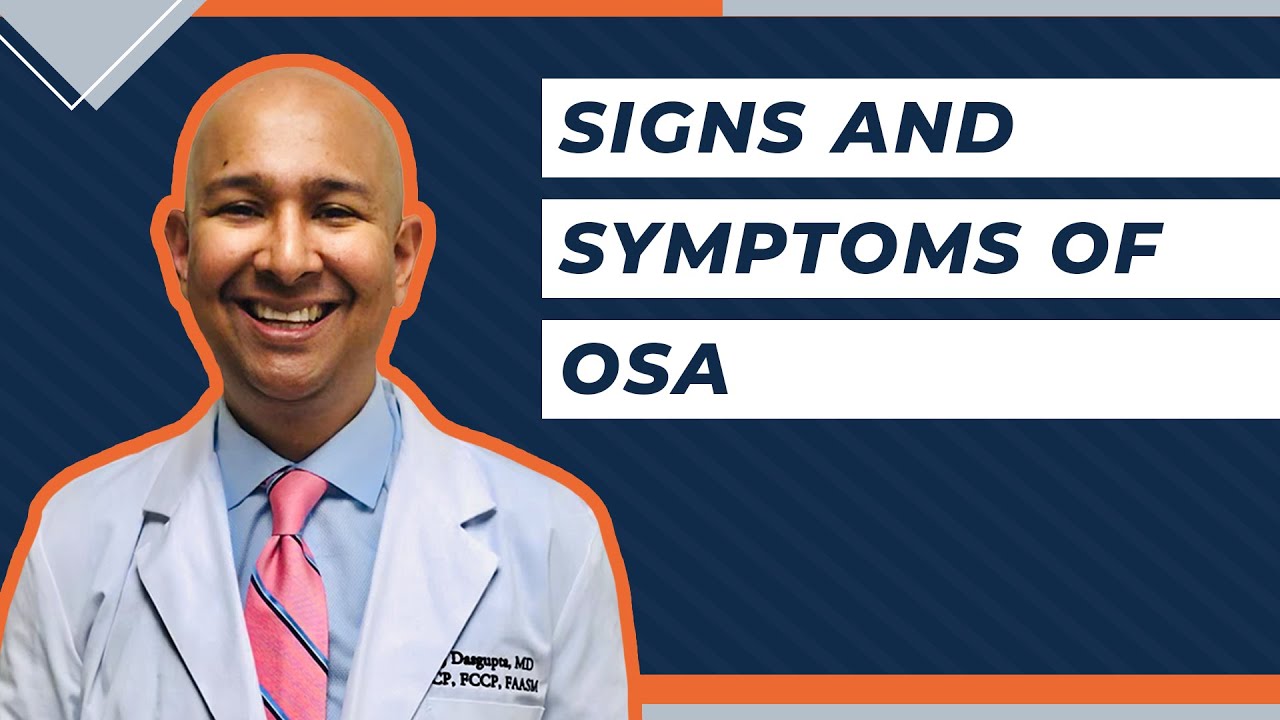If you’re struggling to sleep properly and feeling fatigued, and aren’t sure why, you may be experiencing sleep apnea. Sleep apnea1 is a sleep disorder, with the most common type being obstructive sleep apnea (OSA). Experts estimate that nearly one billion people2 worldwide have OSA.
People with obstructive sleep apnea3 have difficulty breathing when they sleep because their airway either gets blocked or collapses. There’s also central sleep apnea4, which is when the brain fails to send the appropriate signals to the muscles that control breathing during sleep, causing intermittent pauses in your breathing.
Both obstructive and central sleep apnea can increase your risk of heart conditions, strokes, liver problems, and other serious health issues, so it’s definitely worth catching early.1 Here, we’ll cover some common signs and symptoms that you might have sleep apnea.
Please note that if you experience any of the following symptoms and suspect you have sleep apnea, you should consult your doctor immediately so they can formally diagnose you and discuss a treatment plan.
Interested in exploring further? Check out our in-depth guide for sleep apnea here.

1. Dry Mouth Upon Waking
If you often wake up desperately needing water, you may be experiencing a side effect of sleeping with your mouth open. Many people with sleep apnea experience a dry mouth because they have trouble getting enough air through their nose at night and end up breathing through their mouth to compensate.1
2. Headaches and Excessive Tiredness
Along with a dry mouth, you may wake up with a pounding headache, which means you’re probably not sleeping as well as you think.1 A recurrent morning headache is a sign that something is wrong with your sleeping patterns – it likely indicates that you’re experiencing oxygen deprivation5 at night due to sleep apnea. Similarly, you may experience hypersomnia6 (excessive daytime sleepiness) due to this oxygen deprivation.
3. Painful Jaw & Teeth
You might find that you wake up with a sore jaw and sensitive teeth. When combined with other symptoms, this could be a sign that you have sleep apnea.
When the airway struggles to stay open, the body’s natural response may include pushing the lower jaw forward7 to prevent the airway from closing, and this act may cause tension in the teeth and jaw due to muscle strain.
4. Loud Snoring
Unless you’ve managed to wake yourself up snoring, it’s more likely a partner or friend has told you that you snore at night. Sometimes snoring is just snoring, but frequent, loud snoring is often a sign of obstructive sleep apnea.1 If you only snore in certain situations – such as when you’ve got a cold, if you’re drunk, or have hay fever – then you’re probably fine, but if it’s near-constant, then you may want to consult a medical professional.
Learn More: Why Do People Snore?
5. Waking Up Gasping for Air
Waking up and gasping for air is a significant and distressing symptom of sleep apnea, which can exacerbate or cause anxiety in some people.1 If you find yourself waking up choking or gasping for air, you should consult a doctor. Gasping for air occurs when you haven’t been able to breathe enough and means you aren’t getting enough oxygen – something that can have severe long-term effects8 such as heart or brain damage, and sometimes even death.
Find Out More: Can Sleep Apnea Kill You and Central Sleep Apnea
How Can I Test Myself for Sleep Apnea?
In order to test yourself for sleep apnea, you can participate in an at-home sleep study or in-lab sleep apnea study.
During an at-home sleep apnea test9, you use sensors, probes, and a mask to record your breathing patterns during a night’s sleep. Your doctor will then review the results and possibly diagnose you with sleep apnea.
At-home sleep apnea tests are cost-effective, convenient, and often more comfortable, yet they may provide less comprehensive data than sleep studies conducted in a lab setting.
In-lab sleep apnea tests10 are more thorough, using more sensors and complex technology. During a sleep study in a lab, you are constantly being monitored by a sleep technician.10 The sleep technician monitors physiological processes such as your breathing, pulse, brain activity, and your heart’s electrical activity.10
An in-lab sleep study is the most accurate way to determine whether or not you have sleep apnea. However, this process can be costly and is not always as convenient and comfortable as an at-home sleep study.
More: How to Prepare for a Sleep Study
Final Word of Advice
Thankfully, if you’ve noticed these symptoms of sleep apnea, you’ve got time to prevent and treat a potential sleep disorder. The top ways to prevent sleep apnea include quitting smoking, avoiding alcohol and sleeping pills, and avoiding caffeine.1 Additionally, exercising regularly and losing weight can reduce the chances of obstruction, and practicing breathing exercises can strengthen the muscles in your airway.1 Try to sleep on your side or stomach whilst elevating your head slightly in order to reduce the chances of obstruction.1
If your physician decides you need to begin sleep apnea treatment, there are many options available, including CPAP therapy, dental devices, and surgery. Due to the health complications that can arise from untreated sleep apnea, diagnosing and treating this disorder is vital. Lastly, explore the best mattresses for sleep apnea here.

Jill Zwarensteyn
Editor
About Author
Jill Zwarensteyn is the Editor for Sleep Advisor and a Certified Sleep Science Coach. She is enthusiastic about providing helpful and engaging information on all things sleep and wellness.
Combination Sleeper
- 1. “Sleep Apnea”. Mayo Clinic. Last modified April 6, 2024. –
- 2. Benjafield, Adam V., Ayas, Najib T., et al. “Estimation of the global prevalence and burden of obstructive sleep apnoea: a literature-based analysis”. National Library of Medicine. –
- 3. Slowik, Jennifer M., Abdulghani, Sankari., Collen, Jacob F. “Obstructive Sleep Apnea”. National Library of Medicine. Last modified December 11, 2022. –
- 4. Eckert PhD, Danny J., Jordan PhD, Amy S., et al. “Central Sleep Apnea”. National Library of Medicine. 2008. –
- 5. “Morning Headaches? Sleep Apnea Could Be the Cause”. University Hospitals. 2024. –
- 6. “Hypersomnia”. National Institute of Neurological Disorders and Stroke. Last modified February 7, 2024. –
- 7. “The Link Between Sleep Apnea and TMJ”. Millennium Dental. –
- 8. “Hypoxemia”. Cleveland Clinic. Last modified June 15, 2022. –
- 9. “What to Know About an At-Home Sleep Test”. Johns Hopkins Medicine. Webpage accessed October 16, 2024. –
- 10. “Sleep Study (Polysomnography)”. Cleveland Clinic. Last modified February 10, 2024. –